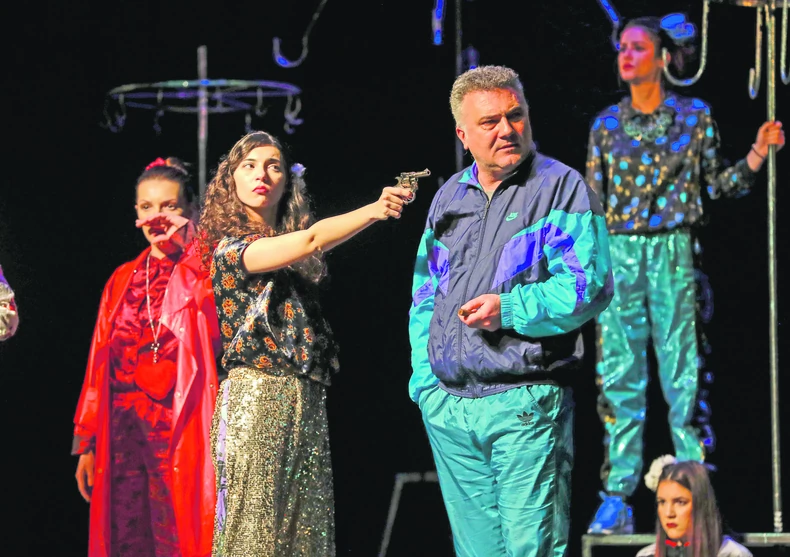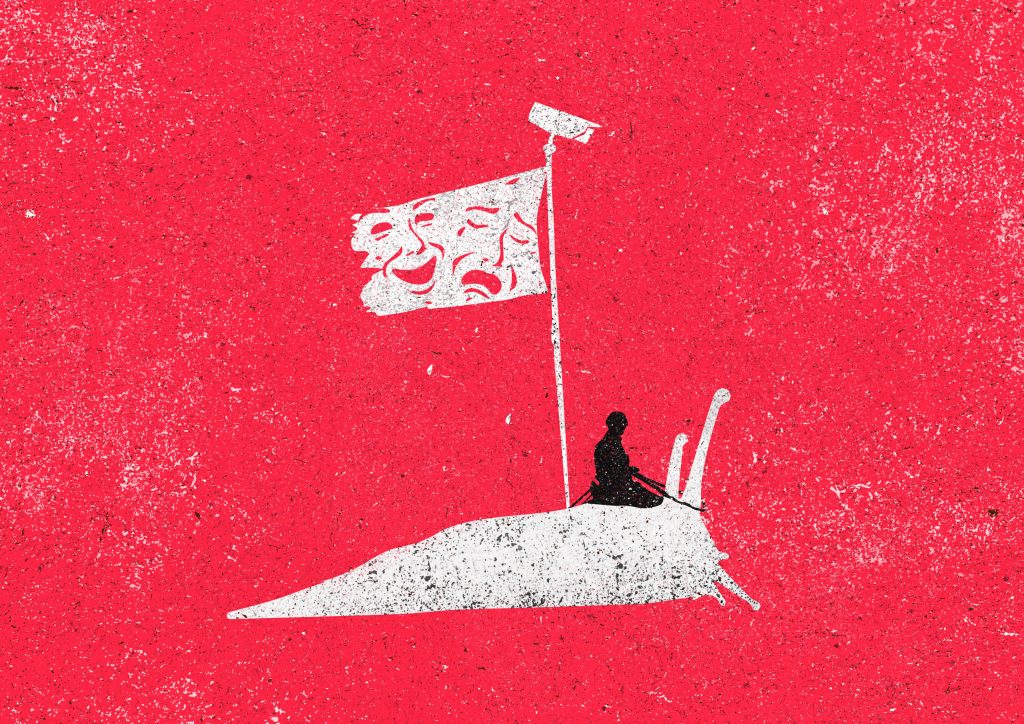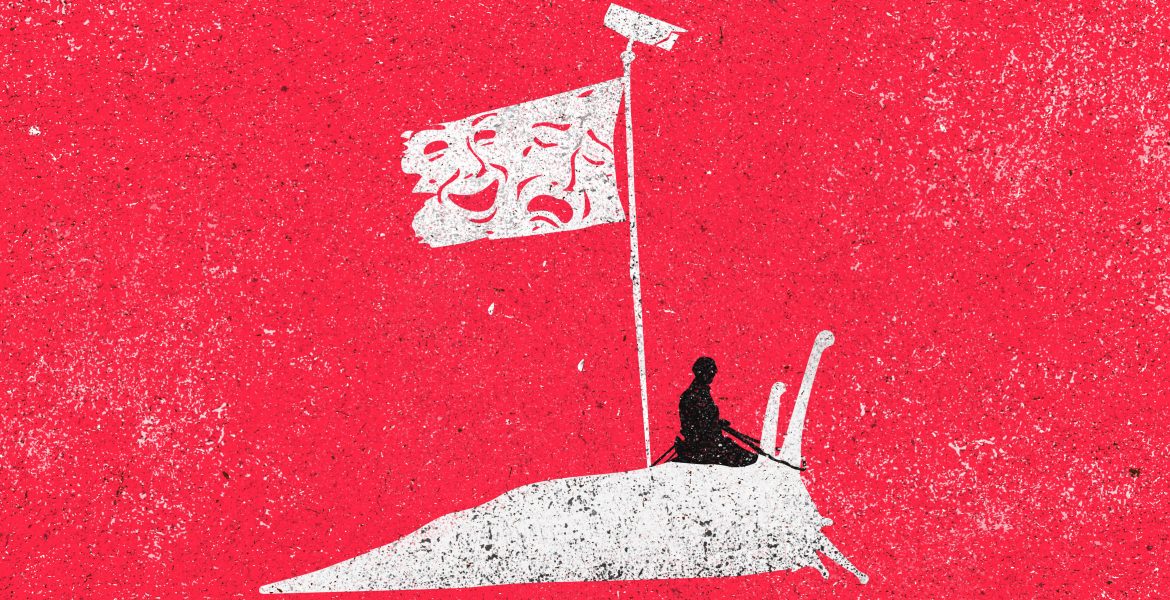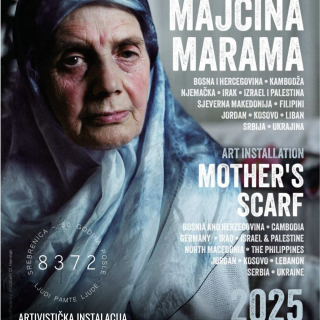The “Lift: Slobodan shou” explains very well the trajectory of the engagement of a large part of the artistic elite in Serbia, not only in the ‘90s but also nowadays, to serve the power and to be in service of nationalistic politics, which still dominate. The philosopher Boris Buden rightfully says that: “For over thirty years now, the Serbian nationalism has, to the detriment of its own people, clearly, decisively and without competition shaped the political and cultural reality of this country [Serbia – note by the author of the article]” (Boris Buden, Društva / Zajednička čitaonica #5, Krokodil, 2020).
“LIFT: Slobodan shou” is an extension of an ideology that served war-mongering and hate generation. Unfortunately, shows like this were created throughout the ‘90s and continue to be created to this day. And not only in Serbia, naturally. Fortunately, the majority of these shows do not garner any public attention, yet they continue to poison the public where they are put on stage. Consequently, war-mongering crowds are bred in the region, continuing to suffer in the throes of nationalism.
At the same time, productions like this one prove that the cultural battle of the artists from the “other camp”, of those with a liberal approach and critical towards the chauvinistic war and policies is extremely hard. Indeed, that battle is conducted under the constant threat of politics, and not just that. When we say the “other camp” we mean the tens and hundreds of Serbian artists and intellectuals, who since the ‘90s are trying to prove the responsibility of the Serbian state during the wars in the ‘90s, the responsibility of Milošević and the necessity that Serbia faces its past and criminal heritage.

For decades there have been powerful opposition voices in Serbia on one end, and on the other end, opportunistic artists who flirted with nationalism any time the opportunity arose. “War is fashionable. The horrible testimonies, the death, and the patriotic kitsch,” said the well-known playwright and intellectual Borka Pavićević since the beginning of the ‘90s. Back then, the established the Center for Cultural Decontamination, a cultural and intellectual stronghold that opposed the Serbian nationalism and attempted to put a reign on the fever of war that had engulfed Serbia. Until her last draw of breach in 2019, Pavićević fought with dignity for human rights and was a powerful, progressive opposition open to cultural cooperation between countries established after the dissolution of Yugoslavia.
After her death, Boris Buden wrote: “Nobody can object that Borka Pavićević’s life has a political meaning. Indeed, many agree that that meaning cannot be reduced to the figure of a lone cultural activist in the social margins, who heroically resisted the non-democratic powers and the majority that supported such powers. Borka Pavićević was more than that. She was part of something larger and with more longevity than herself.” (Buden, Društva / Zajednička čitaonica #5).
Apart from Borka Pavićević normally there were and there are many other artists and intellectuals who held and hold clear positions and stances towards the past, towards the role of Serbia at war, and towards Milošević. Among them we must mention the writer Vladimir Arsenijević and one of the founders of the “Krokodil” Festival in Belgrade, Biljana Srbljanović, a well-known playwright and tireless activist for human rights, Tomislav Marković, a writer and journalist of no compromises, Saša Ilić, a writer oppressed by the authoritarian regime in Belgrade, and one of the promoters of the cultural cooperation Kosovo-Serbia, Zlatko Paković, a courageous journalist and director, Miloš Živanović, an excellent anti-government poet … and many, many others. In the show “An Encyclopedia of the Living”, e theater collaboration between Multimedia Center in Prishtina and the Center for Cultural Decontamination in Belgrade, Paković denounces unapologetically the nationalistic policies and crimes of Serbia and calls for the de-nazification of Serbia.
Therefore, the post-war landscape of the region is not so dark. There have been tens of excellent cultural initiatives between Serbian and Albanian artists, which have contributed to building peace between the two peoples, to creating a more tolerant climate and generally, to the social and political emancipation of the Albanian and Serbian societies.
One such initiative is the publication of two literary anthologies; in Kosovo and in Serbia. Over twenty years had passed since no book from an Albanian author had been published in Serbia. More or less, the situation was similar in Kosovo, where the publication and translation of books from Serbian had become a taboo. In 2011 Multimedia Center published an anthology of the new Serbian prose entitled “From Belgrade, with Love”. The hysteria of Kosovo nationalists was there, as it has been for more than twenty years standing guard. The public refusal (even by some writers) of something that should constitute the most civilizing act was surprising, unpredictable, and despairing.

Simultaneously with the book publication in Kosovo, Saša Ilić and the literary group Beton in Serbia published an anthology of the new literature in Kosovo entitled “From Prishtina, with Love”. It should be said that the reactions of the public in Serbia were more optimistic, even due to the fact that curiosity was bigger –for a literature about which they had no knowledge of, how it was written and what topics it concerned itself with.
Ever since, tens of other books were translated and published in both countries. Several important theater projects, exhibitions, and music concerts have taken place too. Among the most important shows realized as a result of this cultural dialogue initiated by civil society and artists are “Patriotic Hypermarket”, “Romeo and Juliet” and “An Encyclopedia of the Living”. Naturally, there are many other initiatives, larger or smaller but with satisfactory weight and influence nonetheless on both countries.
The trumpets of blind nationalists have continued to echo as an objection to such initiative. In Belgrade, in some cases, such objections were even violent. And whereas the cultural exchange between Kosovo and Serbia has often stalled because of the pressure from nationalists and politicians, the one among other countries in former Yugoslavia seems to be more in track and flows more normally. In either case, the challenges remain and should not be underestimated.
Most of the politicians are not interested in any collaboration – in any collaboration that would bring long-term normalcy and peace because of the set alarm for national urgency due to any inside or outside attach serves to keep the public’s attention away from the real problems that the countries in the region face: poverty, corruption, miserable state of institutions, organized crime, etc.
And more and more people in Kosovo, Serbia and in the region have begun to understand that their enemy is not the Serbs, the Albanians, or the Croats, but their common enemy is the corrupt political castes, the nationalists and former warlords, who, to maintain war and post-war privileges, insist in keeping people intimated and submissive.
But as has already been said, it is not only the politicians, there are many other rusty minds among the so-called intellectual and artistic elites, which loom over the frail peace as ghouls, trying to scare it off and undo it. These are the most unique product that the hegemonic politics, the nationalistic fever and the passion for destruction of the ‘90s could have produced.
The French philosopher Claude Lefort, when he was talking about the great ideological transformations that had occurred and were happening after the fall of communism, saw the strengthening of the Serb nationalism linked with communism: “The current situation shows how difficult the transition from a totalitarian rule to democracy is. Communism has entirely fragmented, more than could have been guessed, the social tissue. It has left behind, apart from material damages, the fear, lack of trust, the habit of subjugation, lack of acknowledgment for the law and lack of individual responsibility. […] How can it be doubted that this nationalism, in the irritated form it has taken in Serbia, is not a legacy of communism” (Lefort, 1993).
Now, when over 30 years have passed since the fall of communism, I am not convinced by the argument that the entire craze this region has generated should be attributed to communism. What can be surely said is that nationalism in this region has had many sources of inspiration. Historically, this seems to have been an easy ground, even fertile, for nationalism.
Nonetheless, what is the way out of this abyss? It is hard to say. The intensification of cultural exchanges in the region, the installation of a critical viewpoint towards the past and the present, and eventually the arrival of new political castes, more open minded, more progressive, and more emancipated, are the steps that could change this troubled region.
However it is, changing the course of the future is closely linked with Serbia. Just as it has been a source and exporter of crisis, it is also the main potential where eventually peace and prosperity in the region may stem from. Although, can Serbia be free of the ghosts of the past, and this is a difficult question. The current political landscape in Serbia, with an autocratic leader like Alexandar Vučić, a former servant of Milošević, does not leave too much room for optimism. The critical voices there are increasingly weaker and fewer. The civil society keeps shrinking and the concept of “independent media” seems to be entirely alien. The situation of the cultural scene is worse, as it is almost entirely subjugated. Those few creators who resist are like lone voices in the desert …
Ultimately, we might see shows like “Lift: Slobodan shou” in the future in Serbia. In fact, I would not be surprised if those would go on to describe Milošević as a hero who tries to stop the ‘90s wars in Yugoslavia!!!
This region is used to playing poker not only with the present but also with the past.
Jeton Neziraj (1977), playwriter, was the Artistic Director of the National Theater of Kosovo. He is currently the Director of the Multimedia Center in Prishtina, an association that deals with literature and theater. He has written over 20 plays, which have been staged in Kosovo and abroad, in Europe and the US, and have also been translated and published in over 15 other languages.
This article has been produced as part of a cooperation between Sbunker and forumZFD Kosovo




